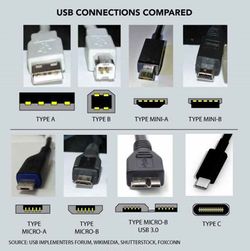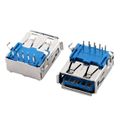USB connector

The (Universal Serial Bus (USB)) connector was designed to standardize the connection of peripherals to personal computers, both to communicate with and to supply electric power. It has largely replaced interfaces such as serial ports and parallel ports, and has become commonplace on a wide range of devices.
The three sizes of USB connectors are the default or standard format intended for desktop or portable equipment, the mini intended for mobile equipment, and the thinner micro size, for low-profile mobile equipment such as mobile phones and tablets.
There are five speeds for USB data transfer: Low Speed, Full Speed, High Speed (from version 2.0 of the specification), SuperSpeed (from version 3.0), and SuperSpeed+ (from version 3.1).
Unlike other data buses (such as Ethernet), USB connections are directed; a host device has "downstream" facing ports that connect to the "upstream" ports of devices. Only downstream facing ports provide power; this topology was chosen to easily prevent electrical overloads and damaged equipment. Thus, USB cables have different ends: A and B, with different physical connectors for each. Each format has a plug and receptacle defined for each of the A and B ends. USB cables have plugs, and the corresponding receptacles are on the computers or electronic devices. In common practice, the A end is usually the standard format, and the B side varies over standard, mini, and micro.
The female connector mounted on the host or device is called the "receptacle", and the male connector attached to the cable is called the "plug".
The USB connector is seen on newer Tektronix test equipment like the RSA Series Spectrum Analyzers RSA306, RSA503, RSA507, RSA513, RSA518, RSA603, RSA607, RSA3303, RSA3308, RSA3408, RSA5103, RSA5106, RSA5115, RSA5126, RSA6106, RSA6114, and RSA6120.
-
"Male" USB plug
-
"Female" USB receptacle
-
"Male" Mechanical drawing
-
"Female" Mechanical drawing

